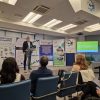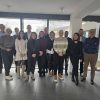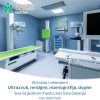In our quest for a healthier society, the journey extends beyond merely reducing disease; it encompasses enabling individuals to thrive across various life dimensions. Health, in its true essence, is multifaceted, embracing more than just mental and physical states. Despite technological advancements, societal health is not progressing. It is becoming increasingly clear that education, effective communication, and collaboration are foundational to cultivating human well-being. Central to this vision are food and nutrition, serving as pillars of social, economic, and physical vitality.
Recognizing the intricate link between our health and the environment, there is a growing demand for accessible and sustainable theranostics technologies. Theranostics, an innovative approach that merges diagnostic and therapeutic functions into a single platform is at the forefront of this evolution. The European Union, a leader in fostering research and innovation to tackle societal challenges, supports the EINSTEIN project through the “Horizon Europe” program (2021 – 2027), aimed at advancing nutrifood-based theranostics for a robust European society.
The EU-funded EINSTEIN project under the Framework Programme
“Horizon Europe” (2021 – 2027) is an excellence initiative for nutrifood-based theranostics for a healthy European society.
Europe faces a critical challenge with 800,000 new cases of digestive cancer annually and 500,000 deaths. Predictions by the International Agency for Research on Cancer (IARC) indicate a 56% surge in colorectal cancer cases by 2040 to more than 3 million new cases per year, with even larger increase of deaths by 69% to about 1.6 million lethal outcomes (IARC & WHO – World Health Organization), emphasizing the urgency of preventative measures.
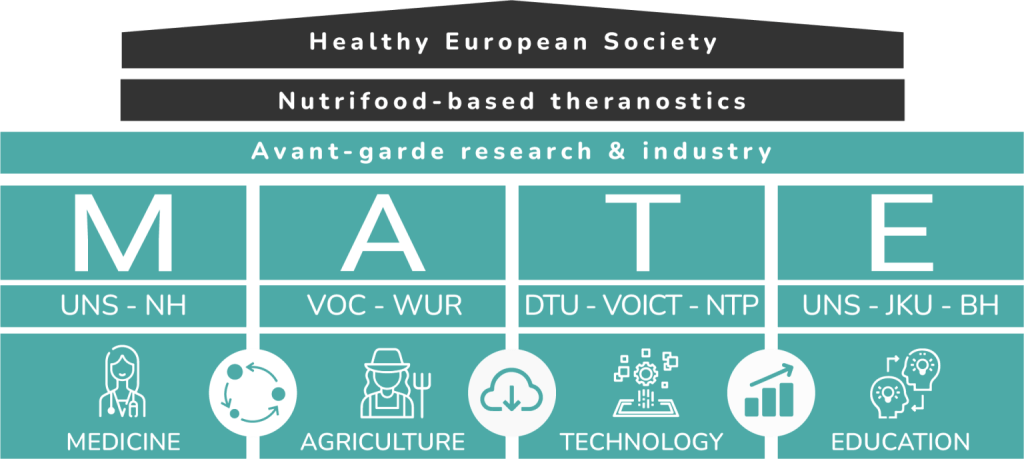
Nutrition and lifestyle play pivotal roles in prevention, with emerging research highlighting how diet influences our microbiomes, which in turn, impact our health and food preferences. Along the digestive tract, we have oral and gut microbiomes. It has been proven the food we consume affects the architecture of those microbiomes (Singh et al., 2017), while microbiomes affect our health and can hack our brains in terms of seeking certain foods (www.sciencedaily.com). With food, we have the power to influence and (re)shape microbiomes. Imbalances in microbiomes can serve as triggers for the onset of diseases. This connection opens avenues for dietary interventions to balance microbiomes and prevent disease, aligning with the European Green Deal’s emphasis on sustainable organic agriculture. However, the potential of these insights remains largely untapped due to fragmented communication among researchers across different disciplines. Bridging this gap, particularly between academic research and market application, is essential for fostering innovation and addressing public health challenges.
The EINSTEIN project aims to catalyse transformation across widening countries like Serbia, focusing on institutional reforms and promoting sustainable food systems, as outlined in the European Green Deal. By integrating medicine, agriculture, technology, and education, the project aspires to pioneer nutrifood-based theranostics.
EINSTEIN will use trans- and multi-disciplinary approach to increase knowledge and technologies in the organic production of crops with improved nutritional and bioactive properties (referred to as nutricrops) for human consumption. These crops will serve as raw materials for designing nutrifood-based sensors with a dual function: therapeutic and diagnostic.
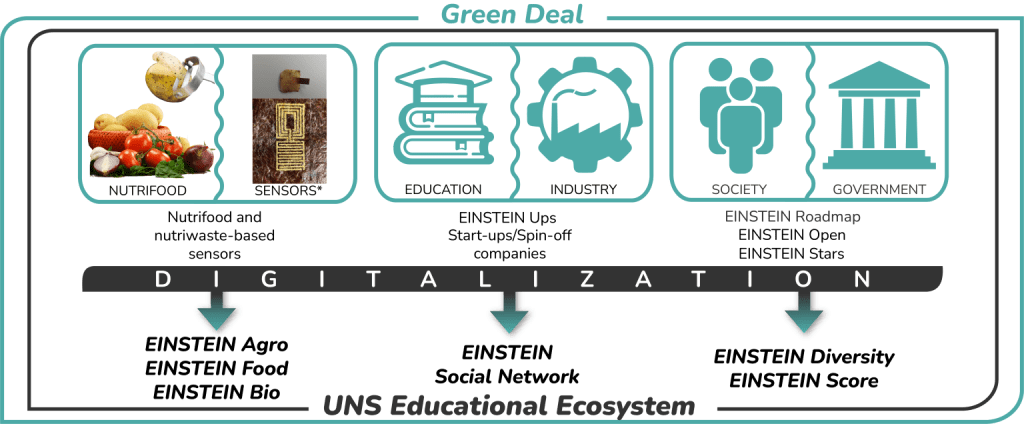
Adopting a transdisciplinary approach, EINSTEIN – Excellence Initiative of Science-Tech Team for European Innovations will enhance knowledge and technologies for the organic production of crops with improved nutritional values, utilized in designing dual-purpose nutrifood-based sensors for diagnosis and therapy. The project’s mission is also to modernize Serbia’s education system, propelling it to a leading position in European research and innovation. Successful transformations and best practices will inspire changes across the Western Balkan region.
EINSTEIN’s overarching goal is to elevate the University of Novi Sad among the top 700 in the Shanghai ranking by 2030, fostering regional development and social equality through innovation, education, and business growth. By connecting research with practical applications, the project endeavours to enhance European society’s health and well-being significantly.
At the heart of the EINSTEIN project lies a clear and compelling mission: to revolutionize knowledge management, enhance educational initiatives, and facilitate technology transfer. This mission is underpinned by a commitment to innovation, collaboration, integrity, and the celebration of unique contributions. Through fostering a strong bond between cutting-edge research and practical applications, EINSTEIN strives to make a profound and lasting impact on the health and welfare of European society.
This project, driven by a vision of accelerated innovation and a seamless integration of environmental sustainability and digital advancement, brings together a diverse consortium of nine partners. This includes four universities, two industry clusters, a science and technology park, a hospital, and a non-governmental organization, spanning three European Community member states and one associated country. Over the next five years, this collective will dedicate itself to achieving the ambitious goals set out by the EINSTEIN mission, shaping a healthier, more resilient Europe.
Meet the EINSTEIN consortium partners:
- University of Novi Sad, Faculty of Technical Sciences (Novi Sad, Serbia)
- Science and Technology Park Novi Sad (Novi Sad, Serbia)
- Business on High Heels (Novi Sad, Serbia)
- Vojvodina ICT Cluster (Novi Sad, Serbia)
- NEW Hospital (Novi Sad, Serbia)
- Vojvodina Organic Cluster (Novi Sad, Serbia)
- Johannes Kepler University (Linz, Austria)
- Wageningen University & Research (Wageningen, Netherlands)
- DTU – Technical University of Denmark (Copenhagen, Lyngby, Denmark)
The project was launched in January 2024.
The New Hospital General Hospital participates in the implementation of work package 3, which is related to Development of Nutrifood-based Theranostic Devices -food sensors and testing their application.

To stay informed about the progress and milestones of the EINSTEIN project, we encourage you to regularly visit the official website. Additionally, join our vibrant community on social media platforms including X (Twitter), Instagram, YouTube, and LinkedIn for real-time updates, insights, and developments in our journey towards transforming European health and science landscapes.
*****
The EINSTEIN project draws inspiration from the remarkable life and contributions of Mileva Maric-Einstein, a distinguished Serbian physicist and mathematician. Notably, she was the sole female among Albert Einstein’s peers at Zürich Polytechnic and played a pivotal role that has long been underrecognized, often overshadowed by the fame of her husband. The debate regarding the extent of her influence on Einstein’s revolutionary theories persists, highlighting her significant, yet overlooked impact.
We are convinced of Mileva’s crucial involvement in the foundational phases of Einstein’s work, particularly during their collaborative period at the patent office in Bern. Albert Einstein himself acknowledged her influence, stating in 1905, “Everything that I achieved in my life, I must thank Mileva. She is my genius inspirer, my protector against the hardships of life and science. Without her, my work would have never been started nor finished.” This testament to her role as a muse and collaborator underscores the profound impact Mileva Marić-Einstein had on one of the most ground-breaking scientific minds of the 20th century, serving as a guiding light for the EINSTEIN project’s vision and aspirations.

